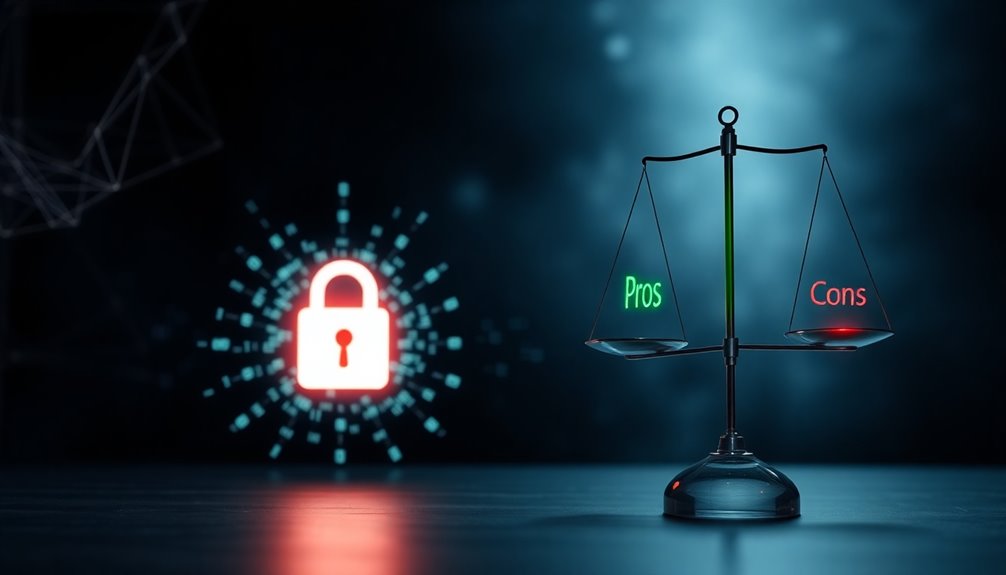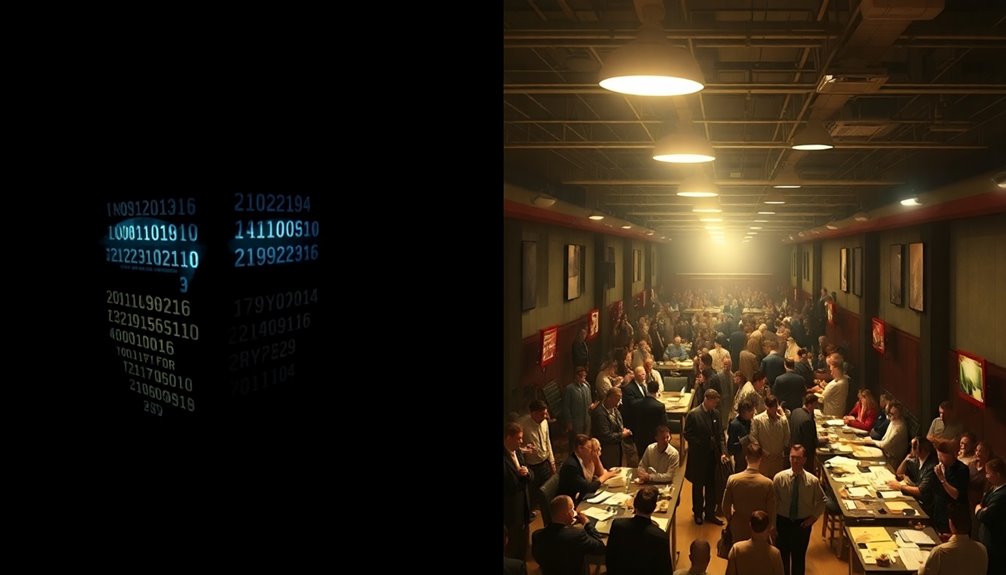Zero-knowledge proof (ZKP) is a groundbreaking cryptographic technique that lets you prove you know something without revealing any details about it. Essentially, it ensures that if a statement is true, you're likely to be accepted as truthful, while a false statement is almost certainly rejected. This interactive process bolsters privacy and security, especially in blockchain applications. It allows you to authenticate your identity or make secure transactions without exposing sensitive data. If you're curious about its applications in finance or its advantages over traditional methods, there's much more to explore.
Key Takeaways
- Zero-Knowledge Proof (ZKP) is a method allowing one party to prove knowledge of a statement without revealing the statement itself.
- ZKPs ensure verification while maintaining privacy through properties like completeness, soundness, and zero-knowledge.
- The process involves an interactive dialogue where a prover responds to challenges from a verifier to demonstrate knowledge securely.
- ZKPs are crucial in blockchain applications, facilitating secure and private transactions without exposing sensitive information.
- Emerging applications include secure identity verification, privacy-preserving transactions, and creditworthiness proof in decentralized finance (DeFi).
Fundamental ZKP Principles

When you explore zero-knowledge proofs (ZKPs), you'll find they revolve around three core principles: completeness, soundness, and zero-knowledge itself.
Completeness ensures that if the statement is true, the verifier accepts it with high probability. Soundness guarantees that if the statement is false, the verifier will reject it almost surely.
Zero-knowledge means the verifier learns nothing beyond the validity of the statement, preserving privacy. In an interactive process, the prover demonstrates knowledge of the statement without revealing sensitive information.
Typically, the prover uses a cryptographic commitment, while the verifier challenges them randomly. Various ZKP types, like zk-SNARKs and Bulletproofs, enhance these principles, making them essential for secure, privacy-preserving technologies in today's digital landscape.
What Zero-Knowledge Means

Zero-knowledge means you can prove a statement's validity without revealing any underlying details, ensuring complete confidentiality.
In zero-knowledge proofs, the prover demonstrates knowledge to a verifier while maintaining privacy. The verifier learns nothing beyond the statement's validity, safeguarding sensitive information.
Key properties of ZKPs include completeness, where an honest prover convinces the verifier if the statement is true, and soundness, preventing dishonest provers from deceiving the verifier if the statement is false.
This concept, rooted in interactive proof systems, was pioneered by Goldwasser, Micali, and Rackoff in 1985.
Today, zero-knowledge proofs play a crucial role in cryptography and blockchain technology, enhancing privacy and security by allowing verification of knowledge without revealing sensitive information.
Interactive Proof Exchanges

Interactive proof exchanges create a dynamic dialogue between the prover and the verifier, allowing the former to demonstrate knowledge without revealing sensitive details.
In these interactive proofs, the prover responds to the verifier's specific challenges over multiple rounds, ensuring the process remains secure and reliable. They rely on probabilistic methods, which help the verifier gain confidence in the prover's claims while maintaining zero-knowledge properties.
The completeness aspect ensures that if the statement is true, an honest prover can convince the verifier with high probability. Conversely, soundness guarantees that if the statement is false, no cheating prover can mislead the verifier significantly.
Together, these properties uphold the integrity of the interactive proof exchange, making it an effective tool in cryptography.
Pros and Cons Overview

While zero-knowledge proofs offer significant advantages, they also come with notable drawbacks. These cryptographic methods enhance privacy by allowing the prover to demonstrate knowledge without revealing sensitive information to the verifier. They facilitate secure transactions in cryptocurrencies like Zcash and Monero, ensuring anonymity.
However, the complexity of implementing zero-knowledge proofs can lead to high computational costs and performance bottlenecks, especially in large-scale applications. Additionally, reliance on trusted setups, particularly in zk-SNARKs, can introduce vulnerabilities if compromised, which undermines security. This challenge is compounded when integrating these systems with existing infrastructure, necessitating careful consideration of scalability and efficiency. As the industry moves toward more sophisticated solutions, examples like franklin templeton and ai agents demonstrate the potential for innovative applications while also highlighting the importance of a robust security framework. Consequently, developers must strike a balance between leveraging advanced cryptographic techniques and maintaining user trust in the system’s integrity.
Despite these challenges, zero-knowledge proofs support regulatory compliance by enabling organizations to validate claims without exposing underlying data, striking a balance between privacy and accountability in various contexts.
ZKP vs. Traditional Verification Methods

Compared to traditional verification methods, zero-knowledge proofs (ZKPs) offer a groundbreaking approach to validating information without exposing sensitive data.
In traditional methods, like password-based authentication, you have to reveal your password, risking interception or theft. ZKPs, on the other hand, allow the prover to authenticate their identity without disclosing their credentials, enhancing data protection.
Verifiers receive proof of knowledge without accessing the underlying sensitive information, maintaining confidentiality. While traditional verification might require sharing complete data sets, ZKPs only need the prover to demonstrate knowledge through mathematical challenges, minimizing data exposure.
This innovative approach significantly enhances privacy and security, particularly in applications like blockchain, where transaction privacy is crucial, allowing users to validate transactions without revealing amounts or participant identities.
Scalability Issues in Implementation

As zero-knowledge proofs (ZKPs) gain traction in various applications, scalability issues can pose significant challenges during implementation. The computational complexity involved in generating and verifying proofs can hinder performance, especially in high-volume environments.
While zk-SNARKs are efficient with smaller proof sizes and quick verification, their reliance on a trusted setup can create bottlenecks. On the other hand, zk-STARKs improve scalability by eliminating the trusted setup, but they may produce larger proofs.
Implementing ZKPs in blockchain systems can also lead to increased overhead from additional cryptographic operations, impacting transaction throughput and latency. Ongoing research aims to optimize these protocols, with hybrid solutions like zk-Rollups batching transactions to enhance scalability without compromising security.
Emerging Applications in Finance

The challenges of scalability in implementing zero-knowledge proofs (ZKPs) have prompted a surge of interest in their potential applications within the finance sector.
Financial institutions are now using ZKPs for secure identity verification, allowing you to prove your identity without sharing sensitive information, which reduces identity theft risks.
In decentralized finance (DeFi), ZKPs enable privacy-preserving transactions, letting you conduct transactions without revealing balances or amounts.
They also enhance loan applications by allowing you to prove creditworthiness without disclosing your entire financial history, paving the way for undercollateralized loans.
Additionally, emerging ZKP technologies like Chainlink's DECO facilitate secure data transfer, enabling compliance with regulatory requirements while maintaining transparency and protecting sensitive customer data.
Utilize ZKPS for Secure Transactions

While many transactions today require the exchange of sensitive information, zero-knowledge proofs (ZKPs) offer a more secure alternative that keeps your data private.
With ZKPs, a prover can validate a transaction without revealing details like the amount or the parties involved, ensuring privacy on public blockchains. This technology enables anonymous payments, allowing you to maintain confidentiality while confirming legitimacy to a verifier.
In online payments, merchants can authenticate your payment capabilities without accessing your personal data, enhancing security and reducing data breach risks.
Additionally, in decentralized finance, ZKPs help you prove creditworthiness without exposing your entire financial history, fostering trust in peer-to-peer transactions and ensuring compliance with privacy regulations.
Frequently Asked Questions
How Do You Explain Zero-Knowledge Proof?
When you explain the concept, think of it as demonstrating knowledge without sharing the actual details.
You can illustrate it with a fun analogy, like finding Wally in a crowded picture. You show you know where he is, but you're not revealing his spot.
This way, you validate your claim while keeping the secret safe. Emphasize that it's about trust and proving something without giving away more information.
What Is a Real Life Example of Zero-Knowledge Proof?
A real-life example of zero-knowledge proof can be seen in the locked safe scenario.
Imagine you've got a safe, and you can open it without revealing the combination. You show someone the contents inside, proving you know the combination without sharing the actual numbers.
This way, they trust your knowledge without learning your secret. It's a clever method that ensures privacy while still demonstrating your capability or ownership.
What Is a ZK in Crypto?
In crypto, a zk, or zero-knowledge proof, allows you to verify information without revealing the actual data.
When you use zk technology, you can prove ownership of assets or validate transactions while keeping details private. This enhances security and privacy in your transactions, especially in cryptocurrencies like Zcash or Monero.
Does Zero Proof Knowledge Exist?
You might wonder if zero-knowledge proof exists. Imagine a way to prove you know a secret without giving it away. Sounds intriguing, right? The answer is yes—zero-knowledge proofs are real!
They allow you to validate information without disclosing any details. These cryptographic methods are revolutionizing how we think about privacy and security.
Conclusion
In summary, zero-knowledge proofs offer a powerful way to verify information without revealing the details. Imagine a bank allowing you to prove your creditworthiness without disclosing your entire financial history. This approach not only enhances privacy but also boosts security in transactions. As you explore the potential of ZKPs in various industries, consider the transformative impact they could have on how we conduct secure exchanges in our everyday lives.









